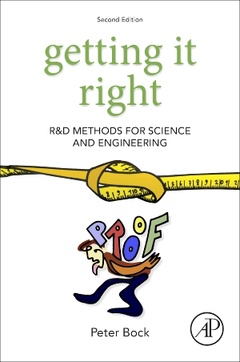Description
Getting It Right (2nd Ed.)
R&D Methods for Science and Engineering
Author: Bock Peter
Language: English
Subject for Getting It Right:
Keywords
Acceptance of knowledge; Channel; Cohort; Conditions; Control task; Conventions; Crusades; Dark Ages; Definitions; Discipline; Documentation; Dogma; Domain knowledge; Electromagnetism; Factors; Framework; Gantt chart; Gaussian elimination method; Goals; Governing propositions; Graphical user interface; Gresham"s Law; Holy Inquisition; Human civilization; Hypothesis; Inducer; Industrial Revolution; Innovation; Invocation point; Knowledge; Level of effort; Local area network; Methodology; Milestone chart; Murphy’s law; Null hypothesis; Operating point pilot; Parameters; Payoff; Peak performance; Peer Review; Peer review; Performance criteria; Performance metric; Precision limit; Presumptive knowledge; Primary task; Problem statement; Process; Project documentation; Project Hierarchy; Propositions; QD pilot; R&D; Range knowledge; Recording; Research and development; Research task; Rome
466 p. · 19x23.3 cm · Paperback
Description
/li>Contents
/li>Readership
/li>Biography
/li>Comment
/li>
Getting it Right: R&D Methods for Science and Engineering, Second Edition, is an authoritative guide to the methodologies that produce coherent and complete R&D projects. Based on the author?s experience in large industrial firms, this book addresses the avoidance of common pitfalls that engineers and scientists routinely face in industry and academia. Special emphasis is placed on the comprehensive analysis of project problems, requirements, objectives, the use of standard and consistent terminology and procedures, the design of rigorous and reproducible experiments, the appropriate reduction and interpretation of project results, and the effective communication of project design, methods, results, and conclusions, embedded in a clear and modern framework of the Scientific Method.
This fully updated new edition also includes an extended case study from industry, additional material about the evolution of knowledge and science and technology and a special focus on the discovery and nurture of technical innovation, both of which reinforce the importance of adherence to the described methodology in both academic and industrial venues. Professional engineers and researchers will find a highly consistent and practical reference for the rigorous conduct and clear communication of complex R&D projects. Students will also find a palatable introduction to the critical concepts of knowing, doing, and Getting it Right.
Part I - Introduction1. Research and Development2. Process and Preparation
Part II - Project Organization3. The Project Hierarchy4. The Project Task
Part III - Knowledge Representation5. An Epistemological Journey6. Categories and Types of Knowledge7. Roles of Knowledge Propositions8. The Limits of Knowledge
Part IV - The Scientific Method 12. Overview13. Analysis14. Hypothesis15. Synthesis16. Validation
Appendices
Index
Scientists, engineers, and project managers involved in R&D projects in industry. MSc students and early career researchers in engineering disciplines including mechanical, manufacturing, aerospace, and electronic engineering
Following the first successful manned Lunar landing in 1969, Bock was invited to join the faculty of the Department of Computer Science at The George Washington University in Washington DC, where he designed and established a new graduate curriculum in Artificial Intelligence. Over the next 20 years he added courses in neurophysiology, cognitive science, and statistics to the computer science core in the graduate AI curriculum to expand the biological knowledge and sharpen the empirical perspective of the students.
During a two-year stay as a visiting professor at the University of Ulm in Germany, Bock and his graduate students developed the well-known Project ALISA (Adaptive Learning for Image and Signal Analysis) with generous funding from the large German corporation Robert Bosch GmbH. For the next 20 years, research funding from both industry and government enabled the support of many doctoral students who are now successfully employed in academia or industry around the world. Bock has published more than 100 scholarly papers and book chapters, as well as presented many invited lectures in government, academia, industry, NGOs, and special public events.
Bock retired from George Washington University in 2011, but still directs several doctoral students as well as his own research in AI, focusing primarily on natural language processing, high-dimensional clustering, and the development of artificial neural networks that acquire and apply their knowledge using adaptive statistical learning. In 2012 he was invited to present a TED Talk, which can be viewed at www.youtube.com/watch?v=CpNfy7AUPl4. His long-term research objective has remained unchanged for the last 45 year
- Presents a standard methodology for conducting rigorous and complete R&D projects
- Includes a detailed case study from an experienced R&D research scientist and engineer
- Provides a consistent framework for knowledge organization and the Scientific Method

